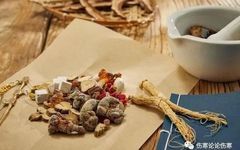Follow↗“Treatise on Cold Damage”, to encounter a healthy life.【WeChat】liusheng729【Disclaimer】Images in the text are sourced from the internet.
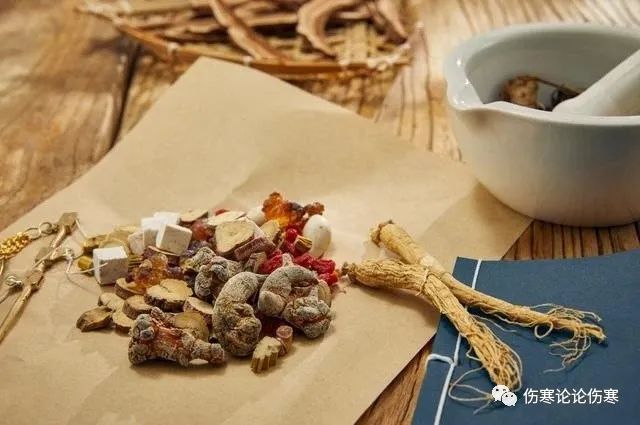
【Introduction】Some content of this article is excerpted from “Liu Duzhou’s Lecture on the Treatise on Cold Damage”, author/Liu Duzhou, reprinted for the purpose of disseminating TCM cultural knowledge, copyright belongs to the relevant rights holders. If there is any improper use, please feel free to contact me for negotiation.
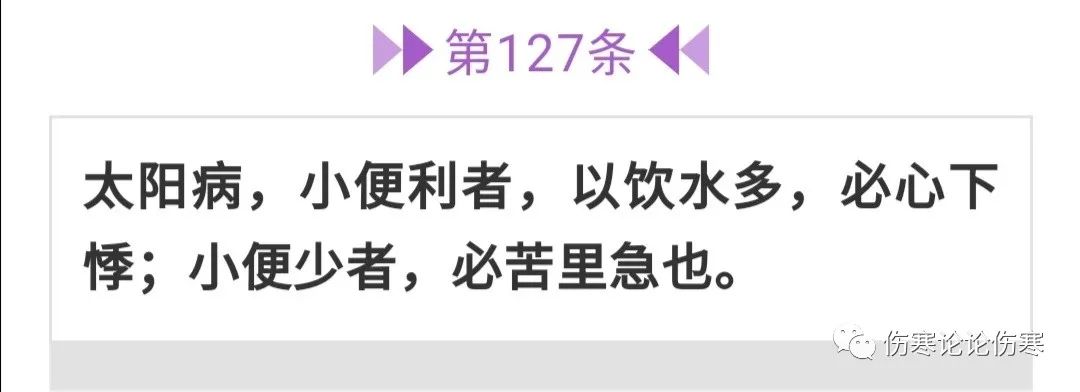
Section 127 of the Treatise on Cold DamageIn Taiyang disease, if there is slight urination, it is due to excessive drinking of water, which must lead to palpitations below the heart;if urination is scant, it must cause abdominal urgency.Commentary by Jin Cheng WujinIf drinking water is excessive and urination is smooth, then water does not accumulate internally, but there is much water in the abdomen, causing palpitations below the heart.The “Essential Prescriptions from the Golden Chamber” states: “If food is scarce and drinking is excessive, water stagnates below the heart, and in severe cases, palpitations occur.”If drinking water is excessive and urination is not smooth, then water accumulates internally and does not flow, leading to abdominal urgency.Explanation by Liu DuzhouThis section continues to discuss the Taiyang water accumulation syndrome, which has diagnostic significance alongside blood syndromes.In Taiyang disease, if there is slight urination and excessive drinking, it indicates injury from water; if one drinks too much water, it injures water, and if one eats too much, it injures food.Due to water injury, it becomes a water evil; drinking too much leads to the spleen and stomach being unable to transform and transport, resulting in water stagnating below the heart, in the stomach, causing palpitations below the heart, which is what?This is the symptom of Fu Ling Gan Cao Tang (Poria and Licorice Decoction), where fever and thirst indicate the use of Wu Ling San (Five-Ingredient Powder), while those who are not thirsty are treated with Fu Ling Gan Cao Tang, which has palpitations below the heart and a sound of water vibration.With slight urination and excessive drinking, water has some outlet, so it can only stagnate in the middle jiao, with water in the stomach, where water qi collides, causing palpitations below the heart, restlessness, and anxiety.The area below the heart refers to the stomach area.If urination is scant, it is more severe than slight urination; this water must stagnate in the lower jiao, and the qi transformation is not smooth, leading to difficulty in urination, hence the abdominal fullness and discomfort, termed abdominal urgency.This abdominal urgency, with scant urination, is different from the hardness and fullness of the lower abdomen due to blood stasis; this is called water accumulation.Thus, water accumulation has two origins: one is the heat of Taiyang entering internally, causing poor qi transformation and difficulty in urination;the other is due to excessive drinking, injuring water, leading to difficulty in urination and abdominal urgency.
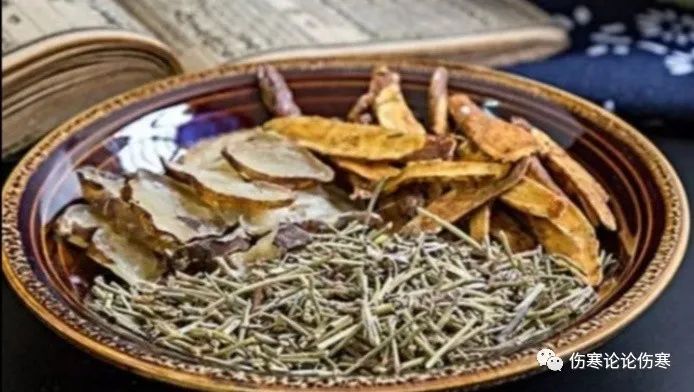
【Golden Chamber】Chest Bi Syndrome, Heart Pain, Shortness of Breath, Pulse Diagnosis and Treatment, Section 9, Item 3Chest Bi syndrome manifests as wheezing, coughing, expectoration, chest and back pain, shortness of breath, with a deep and slow pulse at the cun position, and a tight and rapid pulse at the guan position. The prescription is Guo Lou Xie Bai Bai Jiu Tang (Trichosanthes, Chinese Chives, and White Wine Decoction).Prescription for Guo Lou Xie Bai Bai Jiu TangOne fruit of Guo Lou (Trichosanthes fruit) (crushed), half a jin of Xie Bai (Chinese chives), and seven sheng of white wine.Combine the three ingredients, boil, and take two sheng, divided into warm doses.
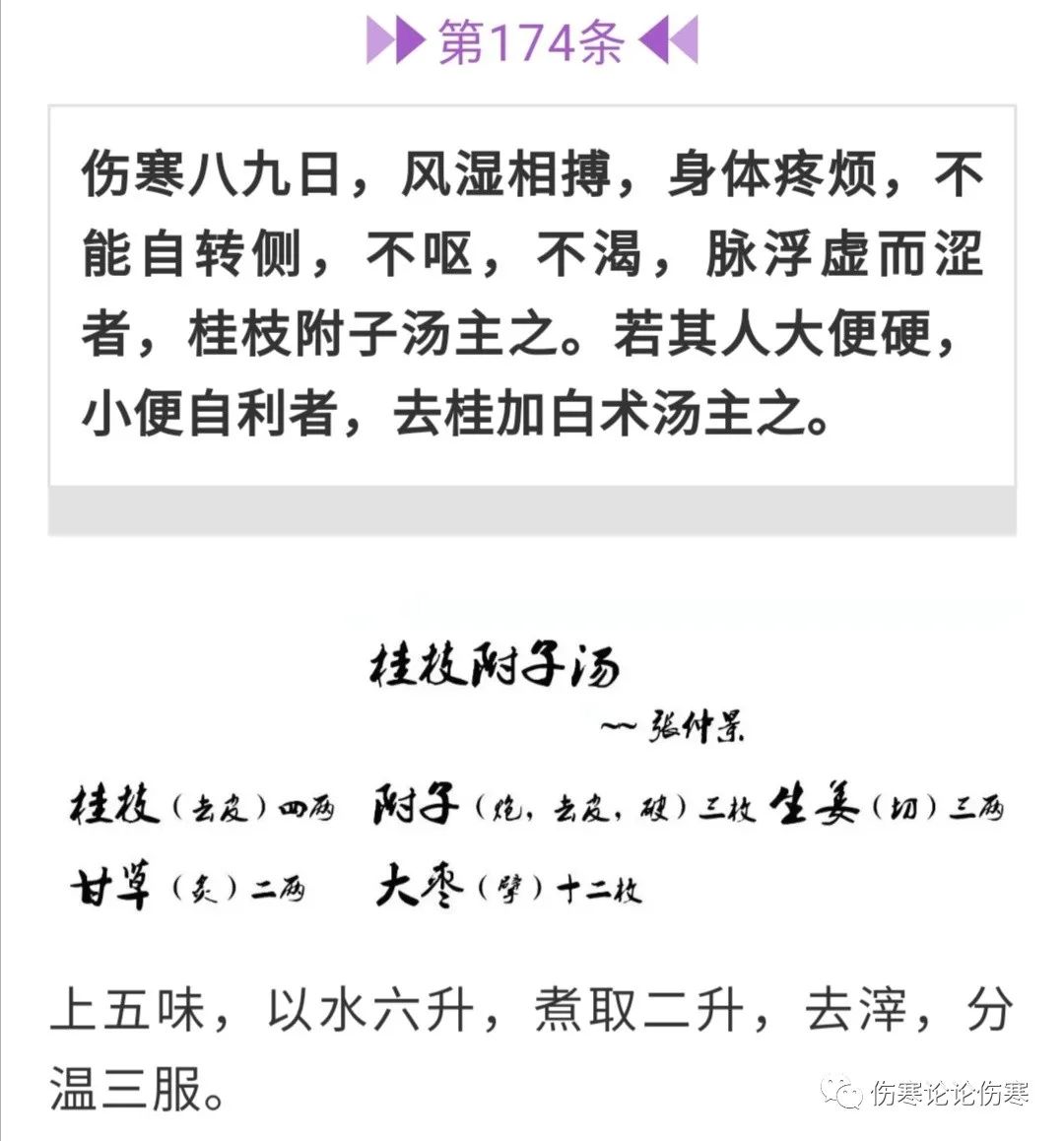 【Case Study】Bi Syndrome. Gui Zhi Fu Zi Tang (Cinnamon Twig and Aconite Decoction)
【Case Study】Bi Syndrome. Gui Zhi Fu Zi Tang (Cinnamon Twig and Aconite Decoction)
A 26-year-old woman has had pain in the joints of her lower limbs for over a year, previously treated with both TCM and Western medicine, with no significant effect. Currently, her condition is still severe, especially with intense pain in the right knee joint, making flexion and extension painful, and walking difficult. On rainy days, the pain becomes unbearable. Her appetite is still good, and her bowel movements are sometimes hard and sometimes loose. Her complexion is pale, with a white and moist tongue coating, a tight pulse, and weak pressure.
【Diagnosis】Diagnosed as Cold-Damp Bi Syndrome
【Prescription】30 grams of Gui Zhi (Cinnamon twig), 24 grams of Fu Zi (Aconite), 18 grams of Zhi Gan Cao (Honey-fried Licorice), 18 grams of fresh ginger, 12 grams of honey-fried licorice, and 4 dates, for 3 doses.
【Follow-up】After taking the medicine, pain was reduced by half, and her spirit and appetite improved. The prescription was: 30 grams of Gui Zhi, 30 grams of Fu Zi, 24 grams of fresh ginger, and 6 dates. After taking 10 doses, the pain completely disappeared.
【Commentary】Warming yang, dispersing cold, and expelling wind and dampness are in accordance with this case.
 437———(1) Exterior Releasing Formulas(Assist Yang and Release the Exterior (including Qi tonification)
437———(1) Exterior Releasing Formulas(Assist Yang and Release the Exterior (including Qi tonification)
2. Rebuilding PowderRebuilding Powder uses Fu (Aconite), Ren Shen (Ginseng), Qi (Astragalus), Gan (Licorice), Gui (Cinnamon), Qiang Huo (Notopterygium), Fang Feng (Siler), Xiang Fu (Cyperus), Chuan Xiong (Ligusticum), and adds Xiao Xin (Asarum) and ginger dates to boil, most suitable for yang deficiency without sweating.
 (12) Blood Activating and Stasis Removing Herbs
(12) Blood Activating and Stasis Removing Herbs
Wu Ling Zhi (Flying Squirrel Feces)Properties: Sweet, Warm.Meridian: Liver.Functions: Invigorates blood, alleviates pain, removes stasis, and stops bleeding.Indications: Blood stasis causing abdominal pain, amenorrhea, dysmenorrhea, and excessive menstrual bleeding with dark clots.Common dosage: 1 to 3 qian.
 Dysmenorrhea, amenorrhea
Dysmenorrhea, amenorrhea
Wu Zhu Yu Tang (Evodia Decoction) (from “Medical Secrets of the Golden Mirror” warming the interior and returning yang formula)Indications for cold and blood stasis syndromeManifestations include delayed menstruation, dark red blood with scanty flow, or even amenorrhea, cold pain in the lower abdomen, preference for warmth and pressure, pale complexion, cold limbs, lower back soreness and weakness, pale tongue with white slippery coating, and a deep, slow, weak pulse.External wind-cold during menstruation may also present with aversion to wind and headache.Ingredients include Dang Gui (Angelica), Dan Pi (Moutan), Wu Zhu Yu (Evodia), Gan Jiang (Dried Ginger), Rou Gui (Cinnamon), Xiao Xin (Asarum), Ban Xia (Pinellia), Mai Dong (Ophiopogon), Fu Ling (Poria), Gan Cao (Licorice), Mu Xiang (Aucklandia), and Fang Feng (Siler). Warming the meridians, moving blood, tonifying blood, and regulating menstruation, dispersing wind-cold.
 Qing Dynasty, Wu Qian
Qing Dynasty, Wu Qian
In the early stage of Taiyang disease, if one does not want to drink water, it indicates the transition to Yangming, then one desires to drink water, which is its norm.Now, in the early stage of Taiyang disease, if one drinks excessive water, it indicates that the person usually has a dry stomach.If the stomach yang is not weak, then the water consumed can also be used to moisten the exterior, causing sweating and resolution.Now, if one drinks excessive water and the stomach yang is not sufficient, even if there is slight urination, it must stagnate in the middle jiao, leading to palpitations below the heart.If there is also scant urination, then water stagnates in the lower jiao, leading to abdominal urgency.It is said: If drinking water excessively leads to palpitations below the heart, it is because the heart is the residence of fire, and excessive water must be constrained.If urination is scant, then water stagnates, hence the abdominal urgency.Wang Hu said: In Taiyang disease, if there is slight urination, it indicates that the bladder is free of evil heat.If the person drinks excessive water, this heat is in the upper jiao, and the heart fire is excessive; even if urination is smooth, if one is thirsty and drinks excessive water, the water will stagnate and disturb the fire, leading to palpitations below the heart.If the person drinks excessive water and has scant urination, this heat is in the lower jiao, as the Taiyang evil heat enters the interior, causing water accumulation that does not flow, leading to abdominal urgency.Qing Dynasty, Ke QinThis is the method of inquiry.As stated in the “Inner Canon”: “One is due to acquisition”, examining the relationship between the upper and lower is essential.Upon seeing the drinking of water, one should inquire about urination.If there is slight urination, it indicates that water is accumulating in the upper jiao, which leads to palpitations below the heart;if urination is scant, it indicates that water accumulates in the lower jiao, which leads to abdominal urgency.Fire is not expressed, causing water to stagnate below the heart and lead to palpitations;water is not expressed, causing water to accumulate in the bladder and lead to abdominal urgency.Qing Dynasty, Huang YuanyuThis clarifies the meaning of scant urination and fullness of the lower abdomen.In cases of slight urination, the body fluids leak, leading to dryness and thirst.If one is thirsty and drinks excessive water, it indicates dampness in the earth and stagnation in the wood, which must lead to palpitations below the heart.If water is unable to drain and urination is scant, then water accumulates in the lower abdomen, leading to abdominal fullness and urgency.Qing Dynasty, Cao YingfuIf the Taiyang heat is excessive, then drinking water must be excessive.Only the Taiyang heat cannot dissipate water; even if there is slight urination, water qi will disturb the heart, leading to palpitations below the heart, indicating that it is not due to blood accumulation.If urination is not smooth and the bladder is tightly bound, it further confirms water accumulation.Hu XishuThis also continues the discussion on water accumulation.In cases of slight urination, water can also stagnate internally, “due to excessive drinking, it must lead to palpitations below the heart”, because excessive drinking leads to water stagnation in the stomach, and water stagnation in the stomach leads to palpitations below the heart.This is mentioned in the “Essential Prescriptions from the Golden Chamber”, stating that if a patient drinks excessive water, there will be retention of fluid below the heart, and in severe cases, palpitations and even shortness of breath may occur.Why does Taiyang disease have this condition with drinking water? Is it common? It is generally similar.When ill, the stomach’s ability to digest water and grains is generally inferior to that of normal individuals, hence, urination is quite frequent.For example, this is the case with Wu Ling San (Five-Ingredient Powder).When to drink, the more one drinks, the thirstier one becomes; if one drinks too much, the stomach will stagnate water, leading to palpitations below the heart, and if it stagnates too much, it will lead to palpitations below the heart.If urination is scant, then if urination is scant, the bladder must accumulate water, leading to abdominal urgency; this indicates that there is water accumulation internally, and this is not merely due to excessive drinking leading to palpitations below the heart, but also due to water stagnation in the stomach. If the bladder accumulates water, it must lead to abdominal urgency and fullness; this is the case, indicating that there is water accumulation internally, and Taiyang disease has an impact, as discussed extensively before. In terms of differentiation, this is also quite important; if the stomach accumulates water, it will definitely lead to severe palpitations below the heart, and even shortness of breath, as previously mentioned. If it is due to poor urination leading to lower jiao water accumulation, then it is bladder water accumulation, which must lead to abdominal urgency and hardness in the lower abdomen.Zhang ZihengIn cases of Taiyang disease, even if urination is smooth, if one drinks excessive water, the spleen and stomach’s ability to transform is insufficient, leading to water stagnation in the stomach, resulting in restlessness and palpitations.If urination is scant, it indicates water accumulation in the lower jiao, which will inevitably lead to symptoms of abdominal urgency and fullness.In cases of slight urination, there can also be water stagnation.

【Treatise on Cold Damage】Query for Sections 111-130
Section 111
In Taiyang disease with wind, if fire is used to induce sweating, the evil wind is affected by the heat, causing blood and qi to overflow, losing their normal state. The two yangs mutually scorch each other, leading to yellowing of the body; if yang is excessive, it may lead to epistaxis, and if yin is deficient, urination becomes difficult. If both yin and yang are deficient, the body becomes dry, with only sweating from the head, returning to the neck, slight abdominal fullness, mild wheezing, dry mouth, and sore throat, or no bowel movement. If prolonged, it may lead to delirium, and in severe cases, to hiccups, with hands and feet restless, fidgeting with clothes and touching the bed; if there is slight urination, the person can be treated.Section 112In cases of floating pulse in cold damage, if the physician uses fire to forcefully induce sweating, the loss of yang will surely cause panic and delirium, leading to restlessness. The prescription is Gui Zhi Qu Shao Yao Jia Shu Qi Mu Li Long Gu Jiu Tang (Cinnamon Twig, Peony, and Dragon Bone Decoction).Section 113In cases of cold damage, if the pulse is not tight and weak, weakness must lead to thirst; if affected by fire, it must lead to delirium. Weakness, fever, and floating pulse indicate that it should be resolved by sweating.Section 114In Taiyang disease, if fire is used to scorch, and sweating cannot be induced, the person must be restless; if the symptoms do not resolve, blood must be cleared, known as fire evil.Section 115If the pulse is floating and the heat is severe, and moxibustion is applied, this is a solid condition; treating solid with deficiency, due to fire, must lead to dryness of the throat and vomiting blood.Section 116If the pulse is slightly rapid, it is crucial not to apply moxibustion, as fire is the evil, leading to restlessness. Pursuing deficiency and chasing solid, blood disperses in the pulse, and even if the fire is slight, internal attack is strong, leading to bone burning and muscle injury, making it difficult for blood to recover. If the pulse is floating, it should be resolved by sweating; using fire for moxibustion, the evil has no way to exit, and due to fire, the condition below the waist must be heavy and painful, known as fire counterflow. To resolve oneself, one must first feel anxious, and only then can sweating be induced. How do we know this? The pulse is floating, hence it is known that sweating resolves the condition.Section 117Burning needles to induce sweating, if the needle site is cold and a lump appears and turns red, it must lead to a running piglet syndrome. Qi from the lower abdomen surges up to the heart; moxibustion should be applied to the lump above, with one strong application, combined with Gui Zhi Jia Gui Tang (Cinnamon Twig Decoction with Additional Cinnamon), increasing the cinnamon to two liang.Section 118If fire counterflows, it should be purged; if burning needles cause restlessness, the prescription is Gui Zhi Gan Cao Long Gu Mu Li Tang (Cinnamon Twig, Licorice, Dragon Bone, and Oyster Decoction).Section 119In cases of Taiyang cold damage, adding warming needles will surely cause panic.Section 120In Taiyang disease, if there is aversion to cold and fever, but now sweating occurs, and there is no aversion to cold and fever, with a fine and rapid pulse at the guan position, it is due to excessive vomiting by the physician. If vomiting occurs for one or two days, the abdomen will feel hungry, and the mouth cannot eat. If vomiting occurs for three or four days, one will not like porridge, preferring cold food, and will vomit in the morning and evening, which is due to excessive vomiting by the physician. This is known as slight counterflow.Section 121In Taiyang disease, if vomiting occurs, but Taiyang disease should have aversion to cold, now there is no aversion to cold and one does not want to approach clothing, this indicates internal annoyance due to vomiting.Section 122If the patient has a rapid pulse, rapid indicates heat, and should consume food to induce vomiting, but if vomiting occurs, it is due to sweating, leading to slight yang qi, and the qi in the diaphragm is deficient, hence the pulse is rapid. Rapid indicates guest heat, unable to consume food. Due to the stomach being deficient and cold, vomiting occurs.Section 123In Taiyang disease, if it has been over ten days, and there is warmth below the heart, with a desire to vomit, and pain in the chest, with loose stools, slight fullness in the abdomen, and mild annoyance, if one has previously excessively vomited and purged, the prescription is Tiao Wei Cheng Qi Tang (Regulate the Stomach and Order the Qi Decoction). If not, it cannot be given. If there is a desire to vomit, with chest pain and slight loose stools, this is not the symptom of Chai Hu Tang (Bupleurum Decoction), as it indicates vomiting, hence it is known as excessive vomiting and purging.Section 124In Taiyang disease, after six or seven days, if the exterior symptoms remain, the pulse is weak and deep, and there is no chest fullness, if the person becomes delirious, it indicates heat in the lower jiao, and the lower abdomen should be hard and full, with smooth urination; if blood is released, it will improve. This is because the Taiyang evil heat is inside, causing stasis heat.Section 125In cases of cold damage with heat, if the lower abdomen is full, and urination is not smooth, but now it is smooth, it indicates blood; it should be purged, and no other medicine should be given, hence the prescription is Di Dang Wan (Di Dang Pill).Section 126In cases of cold damage with heat, if the lower abdomen is full, and urination is not smooth, but now it is smooth, it indicates blood; it should be purged, and no other medicine should be given, hence the prescription is Di Dang Wan (Di Dang Pill).Section 127In Taiyang disease, if there is slight urination, it is due to excessive drinking of water, which must lead to palpitations below the heart;if urination is scant, it must cause abdominal urgency.Section 128Question: What is the condition of chest fullness and hidden fullness? Answer: It is painful upon palpation, with a floating pulse at the cun position and a deep pulse at the guan position, known as chest fullness.Section 129What is hidden fullness? Answer: It is like chest fullness, with normal eating and frequent diarrhea, a floating pulse at the cun position, and a small, fine, deep, and tight pulse at the guan position, known as hidden fullness. A white slippery coating on the tongue indicates difficulty in treatment.Section 130Hidden fullness without yang symptoms does not have alternating cold and heat (one says cold without heat), the person is quiet, and a slippery coating on the tongue indicates it cannot be purged.
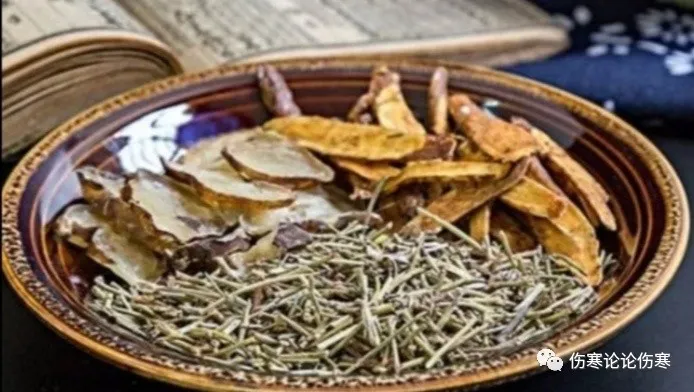 【Warm Reminder】The various prescriptions and formulas mentioned in this article are for reference and study by professional TCM practitioners only. Copyright belongs to the relevant rights holders!
【Warm Reminder】The various prescriptions and formulas mentioned in this article are for reference and study by professional TCM practitioners only. Copyright belongs to the relevant rights holders!
The principle of TCM treatment is “the same disease but different prescriptions for different individuals!” It emphasizes dialectical treatment, and besides the main symptoms, it is also necessary to differentiate based on pulse symptoms, tongue symptoms, etc.
Please do not blindly try medications; this platform does not bear any responsibility for any consequences arising from this!

